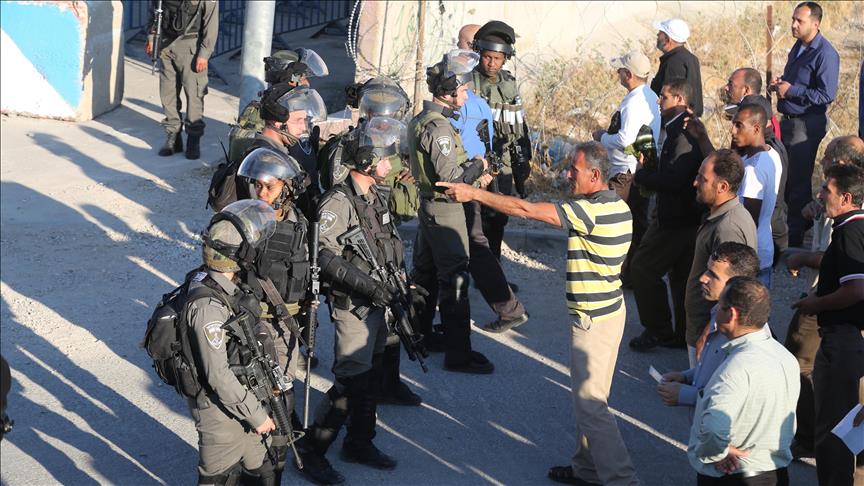ID :
450204
Mon, 06/05/2017 - 15:29
Auther :
Shortlink :
https://oananews.org//node/450204
The shortlink copeid
In Jerusalem, Palestinians mourn 50 years of 'humiliation'

JERUSALEM
His left hand extended to lean on a tree outside East Jerusalem's Damascus Gate, Muhammad stands perfectly still as two Israeli border guards, hands on rifles, face him down.
They study his face intently, ready to react to any movement, as another officer studies his papers. He fixes his gaze beyond them, avoiding direct eye contact.
Muhammad, from the West Bank city of Bethlehem, gets cleared to pass, stuffs his papers into his pocket and ambles away from the checkpoint, down the famous stairs leading towards the Old City's entrance.
The 27-year-old, on his way to pray in the flashpoint Al-Aqsa Mosque during the Muslim holy month of Ramadan, is ambivalent about the search.
"It's humiliating [but] it's well-known, it's not something strange for us. We're used to it," Muhammad, who would not give his second name, told Anadolu Agency. He considers it part and parcel of his trip to Jerusalem.
The image of young Palestinians being searched in and around the Old City and elsewhere in the occupied East Jerusalem is repeated daily. Palestinians call it a daily humiliation but many Israelis consider it a necessary security precaution.
Israel recently celebrated 50 years since "reunifying" Jerusalem by annexing East Jerusalem after the 1967 Arab-Israeli war, allowing Jews to once again visit their "holiest site".
But Palestinians on Monday mourn what they see as half a century of occupation; a constant and evolving security presence, a growing settler population in the Muslim Quarter and a lingering sense of insecurity.
“Humiliated and beaten”
For Ali Jiddah, 68, the war began a "cycle of violence" between Israelis and Palestinians. He was living in the Old City's African Quarter, an enclave for the descendants of African pilgrims who settled and are now known as Afro-Palestinians, when Israel took control of the city from Jordan.
"As a young Palestinian, I began to see what's the meaning of the occupation. Mainly to be stopped in the streets by the soldiers, harassed and humiliated and sometimes beaten," Jiddah told Anadolu Agency, describing his path towards political activity with the Popular Front for the Liberation of Palestine (PFLP) group.
A year later, in 1968, he planted a bomb in West Jerusalem, injuring nine Israelis. He served 17 years in prison until he was released in a prisoner swap.
Jiddah now distances himself from armed resistance, saying his activism as a political tour guide is more effective but can understand why many young Palestinians in recent years have attempted stabbing attacks - mostly against Israeli soldiers.
"I see Israeli soldiers patrolling, stopping the young Palestinians of 15, 16, 17 years, humiliating them in front of all the passers[-by]. I say, oh Ali, at that age, I placed a bomb," he said.
"So I can understand what goes on in his mind. He will go home, sleep, wake up in the morning, [go] straight to the kitchen, pick up the knife and go out. No way back."
The number of Palestinian youth attempting such attacks spiked during a months-long wave of violence from October 2015 that killed more than 200 Palestinians, after alleged attacks or in clashes, and 40 Israelis.
The violence followed clashes in the Old City after Israeli police restricted entry to the mosque for men under 50 during a series of Jewish holidays.
Israel later passed a law in 2016 allowing police to conduct searches at random, having previously been only able to search those they suspected of carrying weapons. Public Security Minister Gilad Erdan defended it as necessary to "battle terrorism and violence."
Israel's focus on security in Jerusalem was similarly sharpened by the Second Intifada, the uprising sparked in 2000 by then opposition leader Ariel Sharon's visit to Al-Aqsa, which killed more than 4,000 Palestinians and 1,000 Israelis.
According to security think-tank Crisis Group, around 40 percent of Israeli deaths were in Jerusalem, increasing Israel's resolve to clamp down on violence.
An occupation
Palestinians say an increase in the number of settlers moving into the Old City's Muslim Quarter has also intensified the security presence, especially private security guards who accompany them through the city's streets.
Aseel Siam, a 19-year-old student, said she has herself experienced how those guards are often on edge, when she was confronted trying to let the settlers pass by her, so she could turn into the alleyway leading to her house.
"So they turned to me and they put their hands, both of them, on their gun," said Siam. "You can't do anything, what you will do? If you just move or if you just took your hand from your pockets, then...bye bye. It's just a crazy thing."
She believed that if the guards had shot her, they would have claimed she was attempting to attack them, a concern of many young Palestinians after the violence began in 2015.
Siam said it is hard for Palestinians to see Israeli forces in every part of the city but the searches have a more direct impact on her younger brothers.
"Every time they are coming to the house they stop them. They check them. Touching them all over the body, searching them for something – and they are just coming to the house," she said.
"Live as a Palestinian just for two weeks and you will see... It's an occupation."





